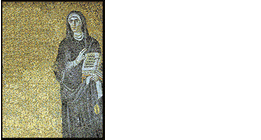 |
|
|
|
| Class
Prep |
|
|
|
Were Jewish Women Oppressed?
The Babatha Archive
- Audio version (wmv file, 7.15MB)
-
- The
study of gender in early Christianity must begin with the situation of women in
Roman Palestine, since this is where Christianity was born. In the last fifty
years, our understanding of Roman Palestine has blossomed with the discovery of
several caches of scrolls from the region. Today, we will look at one such cache,
the Babatha Archive.
-
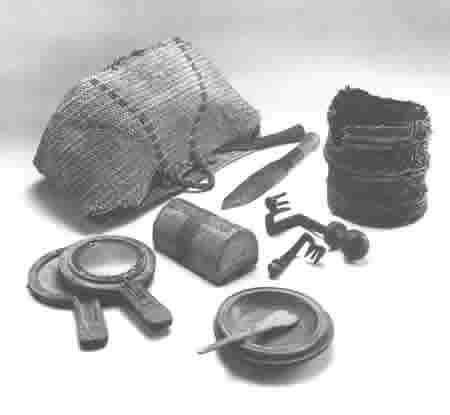 The Babatha Archive is a collection of private papers of a woman named Babatha
who perished in the Second Jewish Revolt against Rome (132-135 C.E.).
She and other refugees had been living in towns along the western coast of the
Dead Sea, and as the Romans approached,
they fled to caves in the wadi cliffs along the coast, taking some of their personal
belongings and papers with them. Some of these items are pictured to the right
(a bag, a knife, two keys, a jewelry box, and two mirrors). The Romans found the
refugees and besieged the caves, eventually lighting fires at the cave openings
in order to asphyxiate Babatha and her companions. Their skeletons were found
near these artifacts. The Babatha Archive is a collection of private papers of a woman named Babatha
who perished in the Second Jewish Revolt against Rome (132-135 C.E.).
She and other refugees had been living in towns along the western coast of the
Dead Sea, and as the Romans approached,
they fled to caves in the wadi cliffs along the coast, taking some of their personal
belongings and papers with them. Some of these items are pictured to the right
(a bag, a knife, two keys, a jewelry box, and two mirrors). The Romans found the
refugees and besieged the caves, eventually lighting fires at the cave openings
in order to asphyxiate Babatha and her companions. Their skeletons were found
near these artifacts. -
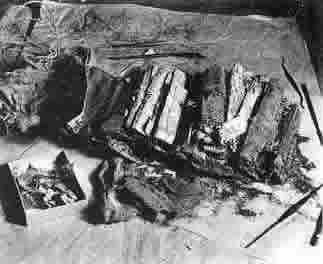 Today's primary readings are selections from the 37 papyrus documents in Babatha's private papers. She had
hidden the cache in a rock crevice, where they were found in 1961 by a team of Israeli
archaeologists pretty much as you see them to the left. The documents were carefully
opened and photographed so that the writing on them could be studied. The documents
reflect various legal proceedings in which Babatha and her relatives were involved.
Since the names are unfamiliar and several names like Jesus and Miriam repeat frequently, a family
tree is available to help keep track of the individuals mentioned. Today's primary readings are selections from the 37 papyrus documents in Babatha's private papers. She had
hidden the cache in a rock crevice, where they were found in 1961 by a team of Israeli
archaeologists pretty much as you see them to the left. The documents were carefully
opened and photographed so that the writing on them could be studied. The documents
reflect various legal proceedings in which Babatha and her relatives were involved.
Since the names are unfamiliar and several names like Jesus and Miriam repeat frequently, a family
tree is available to help keep track of the individuals mentioned. -
- As
you read these documents, make a list of everything that is unfamiliar, surprising,
or unclear, especially with regard to the legal status of the women who are mentioned
(Babatha, Shelamzion, Miriam).
-
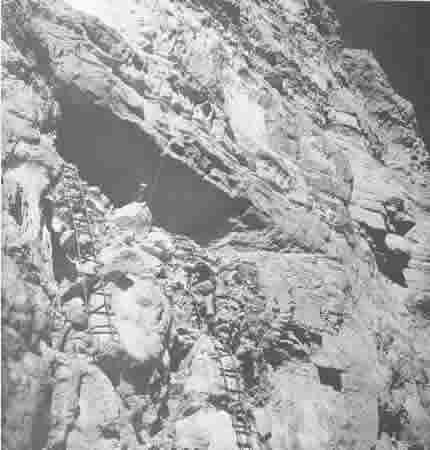 |
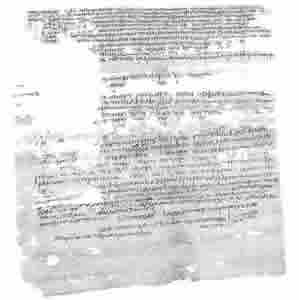 |
The
Cave of the Letters,
where the Babatha Archive was found. |
Papyrus
Yadin 12, Extract of Council Minutes |
-
-
- Assigned Readings
-
- Primary: Excerpts
from the Babatha Archive (please print and bring
to class)
-
- Secondary: WCO 50-79 (on Camino if you do not yet have the course textbook); online class prep
-
- Slides for Lecture
-
-
- Today's Author
-
-
-
- Further Reading
-
- Czajkowski, Kimberley. Localized Law: The Babatha and Salome Komaise Archives, Oxford Studies in Roman Society and Law. New York: Oxford University Press, 2017.
-
- Cotton, Hannah. "The Guardianship of Jesus, Son of Babatha: Roman
and Local Law in the Province of Arabia." Journal of Roman
Studies 83 (1993) 94-108.
-
- Ilan, Tal. Integrating Women into Second Temple History. Tübingen:
Mohr Siebeck, 1999.
-
- --------. Jewish Women in Greco-Roman Palestine. Peabody,
Massachusetts: Hendrickson, 1996; original, Tübingen: J. C. B. Mohr (Paul
Siebeck), 1995.
-
- Katzoff, Ranon. "Babatha." In The Encyclopedia
of the Dead Sea Scrolls (ed. Lawrence H. Schiffman and James C. VanderKam;
New York: Oxford University Press, 2000) 1.73-5.
-
- --------. "Polygamy
in P.Yadin?" Zeitschrift für Papyrologie und Epigraphik
109 (1995) 128-32.
-
- Laqueur, Thomas. Making Sex: Body and Gender from the Greeks to Freud. Cambridge, Massachusetts: Harvard University Press, 1990.
-
- Lewis, Naphtali, Yigael Yadin and Jonas C.
Greenfield, eds. The Documents from the Bar Kokhba Period in the
Cave of Letters, Vol. 1, Greek Papyri, Aramaic and Nabatean Signatures
and Subscriptions, JDS 2. Jerusalem: Israel Exploration Society,
The Hebrew University of Jerusalem, and the Shrine of the Book, 1989.
-
- Yadin, Yigael. Bar-Kokhba: The Rediscovery of the Legendary Hero
of the Second Jewish Revolt against Rome. New York: Random House,
1971.
-
- Yadin, Yigael, Jonas C. Greenfield and Ada Yardeni. "Babatha's
Ketubba." Israel Exploration Journal 44 (1994)
75-101.
-
-
- Links
-
- The
Orion Center for the Study of the Dead Sea Scrolls and Associated Literature
- Hosted at Hebrew University in Jerusalem, a hub of information and current scholarship
on the Dead Sea Scrolls.
- The
Shrine of the Book - Part of the Israel Museum in Jerusalem that was built
to house the Israeli portion of the Dead Sea Scrolls collection, including Yadin's
discoveries at Nahal Hever (the Babatha Archive, the Archive of Salome Komaïse,
and the Bar-Kokhba Letters).
- Andreas Viselius, De humani corporis fabrica - This Renaissance-era manuscript is the founding work of modern anatomy, and illustrates what Thomas Laquer terms the "one-sex body" in western science—the notion that men and women were not opposite sexes, but rather the same sex. The male is normative, with exterior sexual organs, while the woman's reproductive organs are represented as identical to male organs, only inside her body. At this web site, Daniel Garrison and Malcolm Hast have translated the work and include the illustrations. Book 5, chapter 15, "On the Uterus and the other female organs serving generation," has yet to be translated.
-
-
- Sources
-
- Photographs
- Babatha Archive Photographs: Helen Bieberkraut, Werner Braun, Moshe
Caine, David Harris, Edi Hirshbain, Rolf Kneller, Kodansha Publishers, Garo Nalbandian,
Ronald Sheridan, in Moshe Perlman, The Dead Sea Scrolls in the Shrine of the
Book (Jerusalem: The Israel Museum, 1988) 83 (Cave of Letters), 85 (personal
items), 88 (scrolls of archive), 89 (P. Yadin 12).
-
- Kraemer:
Kenneth Kauffman, from the back cover of her book, Her Share of the Blessings:
Women's Religions among Pagans, Jews, and Christians in the Greco-Roman World
(New York: Oxford University Press, 1992).
-
- Music
- Peter Gabriel, "Passion." From Passion: Music for
The Last Temptation of Christ, a Film by Martin Scorsese (Geffen M2G 24206,
1989) track 15.
-
|
|
|
|
|
|
|
|
